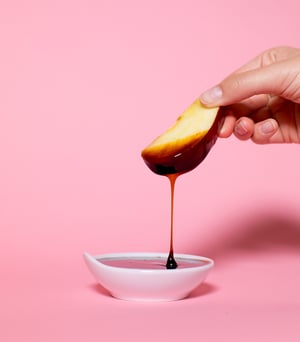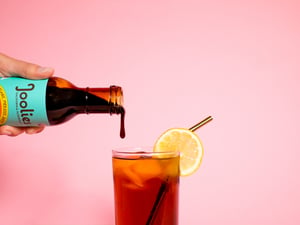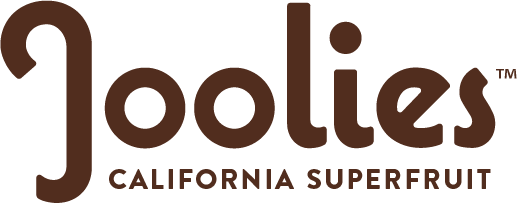Honey
Honey is one of the oldest sweeteners in the game, with beeswax dating back thousands of years. One of the main reasons people love honey is because of its antibacterial properties, being used as a sore-throat soother, face mask agent, and *healthier* sweetener. It has slightly more nutrients than cane sugar but processes very similarly within the human body. If you're in a bind, honey is easily accessible at most grocery stores but make sure you're researching the source and quality.
Moreover, in case you haven't seen Bee Movie (2007), honey isn't all it's cracked up to be. We just did a full article on the impacts of honey here (ADD LINK), and, honestly, it's very disappointing to see how bee populations are dying because of our sweet teeth.
Maple Syrup
Like honey, maple syrup has a very high glycemic index and still considered an added sugar within a daily diet. There are no other ingredients typically within maple syrup that add to its sweetness, however, the sugar is still absurdly high. Don't get me wrong, maple syrup is delicious on fresh pancakes and is ok to have once in awhile, but you should maybe reconsider adding into your meal prepped muffins.
According to Consumer Report, "If you downed ¼ cup of maple syrup—the amount listed as a serving on the Nutrition Facts Label—you’d get 80 percent of your daily need for riboflavin, about 6 percent of calcium, 11 percent of zinc, and 4 percent of potassium," and honestly, the sugar content is not worth the nutrients. If you're looking to get more vitamins and minerals out of your diet, eating whole foods is your best bet always. Again, like honey, it isn't the worst thing in the world to eat, however, for daily consumption it's better to do some more research.
Stevia
This sweetener has been around for forever and was probably used by your mom or aunt, since it was largely used by diet culture for decades. Stevia contains less calories, claims to not spike blood sugar, and can be a helpful tool to control weight loss. However, many brands you find at the store are not entirely natural.
Many of them contain "natural flavors" or erythritol to stabilize and sweeten, which can be very irritating and inflammatory to the body. Most don't even use real stevia leaves! The benefits that are associated with stevia are typically personal experiences or trends, despite having no real conclusive evidence.
Coconut Sugar
Due to the chemical makeup of coconut, the sugar produced from the palm has a lower glycemic index rating than white sugar. In addition, the less harsh processing allows the nutrients to be somewhat retained, which contain minerals like iron and calcium. However, these benefits are only slightly better than white sugar, so don't be fooled by creative marketing!
Fruit Jam
But...fruit is natural so jam is good, right? Not always! Fruit, yes, is nature's candy, but many jams and jellies add extra sugars and preservatives like cane sugar, fruit juice, and pectin to keep it fresh and sweet. If you are making it homemade, please check the recipe for added honey, raw sugar, or others, because *remember* it's still the same thing!
If you're avoiding added sugars entirely, then mashed fruit is the better option (plus, it saves you a few extra bucks). One of my personal favorites is finely mashing up some strawberries or raspberries as a substitute in my PB 'n' J.
However—compared to maple syrup and honey—fruit jam has approximately half the amount of sugar per 100 grams. If you're just really craving some toast with true jam, Good Good makes a great natural raspberry jam with way less added ingredients 🍓

Blackstrap Molasses
Despite its old history, molasses has some shocking health benefits! Out of the cane sugar-derived bunch, molasses contains the highest levels of antioxidants, minerals, and vitamins. Studies claim it can help diabetes, blood cells, bone health, and acne!
Nevertheless, it is still a massive source of added sugar and carbohydrates just like maple syrup. So, for problems like acne, it could possibly aggravate the situation depending on
your tolerance to sugary foods. Like always, whole foods will provide you with these same nutrients without the immense amounts of sugar.
Rice Syrup
Interestingly enough rice syrup is one of the most common sweeteners despite not being very easily found in grocery stores. With that said, it is one of the cheapest additives for companies to buy in bulk and integrate into their products.
Even though it does come from rice, a natural product of the Earth, it comes with some pretty steep sacrifices. This sweetener has a GI ranking of 98 out of 100, essentially stating that it is more likely than not to create some gnarly blood sugar crashes. Rude!
Agave Nectar
Shots! Shots! Shots! Just playing around...but speaking of shots, did you know agave is the main ingredient in tequila? The agave plant is very versatile and can be used to develop sweeteners, which is what also gives tequila its unique flavor.Despite being a popular substitute, agave nectar is a mixed bag. Relatively, the nectar is lower on the GI index, making it a suitable sweetener if you're avoiding the sugar crashes of rice syrup or honey. On the other hand, nectar is largely fructose, which is totally acceptable if it is in proportionate amounts. However, agave contains excess amounts, which can be detrimental to your metabolism and insulin levels if eaten long-term.
Monk Fruit
Like Stevia, Monk fruit is a zero-calorie sweetener popularized thanks to its natural sourcing. Multiple studies have found the fruit to contain good amounts of antioxidants, anti-cancerous agents, and benefits for diabetes patients.
Yet, the concern with monk fruit found in stores is the (of course) man-made additives like erythritol and maltodextrin. Even though these sugars do not change the nutrition label all that much, they are still inflammatory to the body. The studies done on monk fruit are also done in much higher concentrations than in-store products. Overall, there need to be some more studies on more commonly found products to truly determine if it's a better alternative!
Date Syrup
Last but not least, date syrup! Dates are a super fruit—oozing with tons of vitamins, minerals, antioxidants, anti-cancerous agents, and more. Everything from magnesium, potassium, copper, manganese, and calcium...dates have you covered. Did you know they have 14x more potassium than honey and even more potassium than a banana by weight? That's right! They also have double the amount of magnesium than maple syrup, which definitely helps your morning constitution if you know what I mean 😜Most of its competitors are adding extra unnatural sugars and chemical-based ingredients to their "natural" products, which takes away the purpose doesn't it? Our precious dates are too good to be tampered with, which is why we leave them as they should—all natural!
Conclusion
Indulging in your sweet tooth is not a bad thing, in fact, it's good once in awhile! What's important is that you honor your hunger cues, feelings, and overall wellbeing. Remember to ALWAYS check the nutrition label even if the packaging says "no added sugars" or "just fruit." Advertising can be very misleading, so it's better to take the few extra seconds to read the ingredients. If you can't pronounce some of the names, it's probably a big no-no. Sugar is still sugar, no matter where it comes from!
As a good rule-of-thumb, prioritize eating whole foods first; don't rely on man-made products to get your energy for the day. Eating fresh veggies and fruits are the keys to long-term health, no matter what lifestyle you live! 🍉🍆🍑🍌🌽








